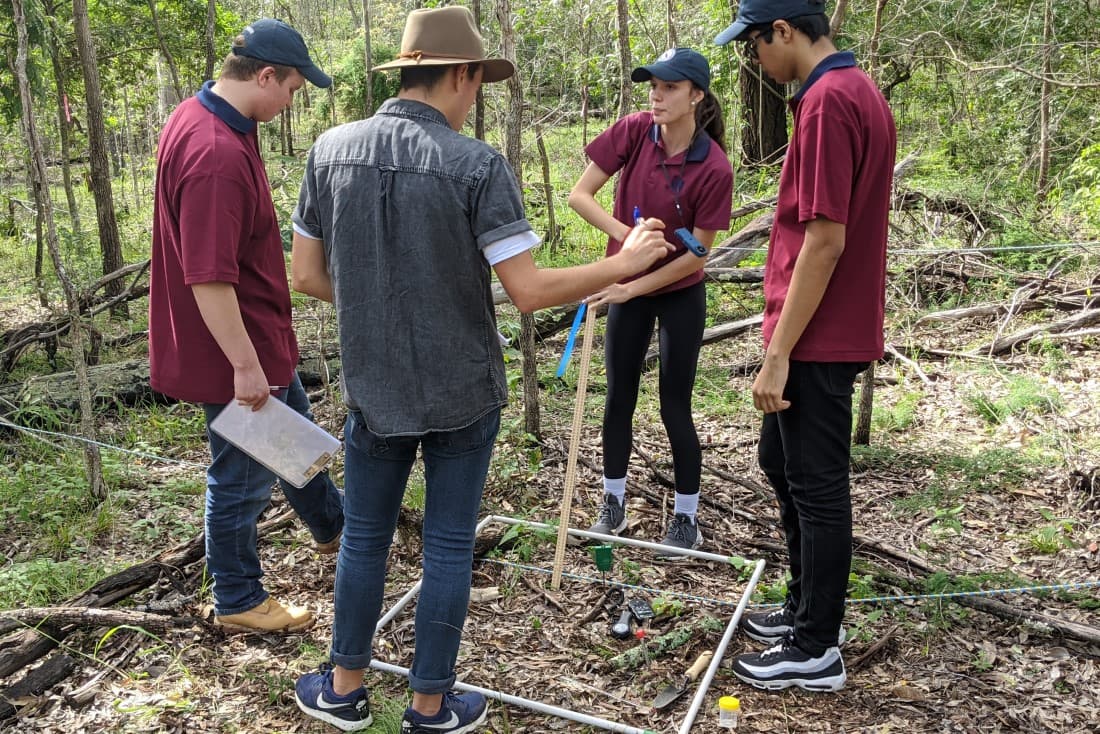
Bring science to life
Introduce your students to our unique living laboratory at the Samford Ecological Research Facility (SERF) to complete their Biology Unit 3 mandatory practicals.
QUT is supporting schools with facilitated day visits to assist in the completion of their Biology Unit 3 mandatory practicals. Students will complete their mandatory practicals on one of QUT’s real-world research sites: Samford Ecological Research Facility (SERF).
The visit
Schools can choose one of two options for their day visit.
Option 1 – Combined mandatory practical skills and student experiment data collection
Note: This option is currently under review and not available. Contact engage.science@qut.edu.au with enquiries.
- Students will learn and implement a range of ecological sampling techniques to complete the mandatory practicals from Unit 3 (topics 1 and 2)
- Students will collect data to support completion of their own modified IA2 Student Experiment.
Option 2 – Student experiment data collection only
- Students will collect data to support completion of their own modified IA2 Student Experiment.
Preparing for your visit
Prior to the visit we will provide further resources and information, including a:
- detailed itinerary
- flora and fauna guide
- digital copy of the student work booklet
- school guide containing important details to help you prepare for your visit.
All of the equipment needed for the mandatory practicals will be supplied by QUT. Alternatively, schools may bring their own equipment. Make sure you read the essential information (PDF file, 233.1 KB).
A QUT student ambassador will also be onsite to facilitate your field trip and assist with equipment use. Active participation of all attending teachers is required to help students gather sufficient and relevant data to formulate their questions onsite or back at school.
About SERF
The Samford Ecological Research Facility (SERF) is a living laboratory for research and teaching across ecology, urban planning, agriculture, engineering and more.
The property was generously bequeathed to QUT in 2009 by the estate of renowned Queensland entomologist Dr Elizabeth Nesta Marks AO. Managed by QUT's research division, the 51-hectare property is located in the Samford Valley.
Bookings
Bookings are available for Term 1, 2024.
The site can facilitate up to 60 students per day. You can book multiple days if you have more than 60 students.
Times
Approximately 9am to 2.30pm.
Fees
$450 per day per school.
Payment is required in full before your field trip and includes a non-refundable deposit of $100 for cancellations.
Schools are responsible for their own transport arrangements to and from the site.
QUT has a commitment to aspiration and inclusion and aims to support students from low socio-economic, rural, Indigenous and Pasifika backgrounds. Fees subsidies may apply for widening participation schools. Faculty of Science Engagement Team at engage.science@qut.edu.au for more information.
Ready to book?
Book your field trip via our booking form.
Essential information
Make sure you read the essential information (PDF file, 233.1 KB) before you plan your visit.
Curriculum links
Biology Unit 3 Biodiversity and the interconnectedness of life
Students will collect data using sampling methodologies to support completion of the mandatory practicals from Unit 3.
Topic 1: Describing biodiversity
- Mandatory practical: Determine the species diversity of a group of organisms based on a given index such as Simpson’s Biodiversity Index.
- Mandatory practical: Use the process of stratified sampling to collect and analyse primary biotic and abiotic field data to classify an ecosystem.
Topic 2: Ecosystem dynamics
- Mandatory practical: Select and appraise an ecological surveying technique to analyse species diversity between two spatially variant ecosystems of the same classification (e.g. a disturbed and undisturbed dry sclerophyll forest).
- IA1: Data test - data is available to assist with the formulation of this assessment.
- IA2: Student experiment - students complete the primary data collection and then create a research question to modify the experiment.
Contact us
If you have any questions contact QUT Faculty of Science Engagement via email engage.science@qut.edu.au.